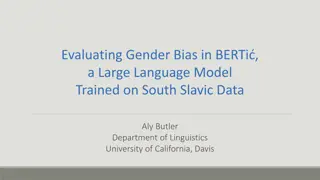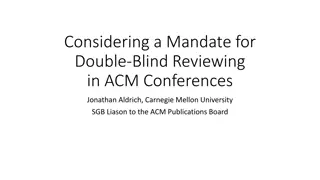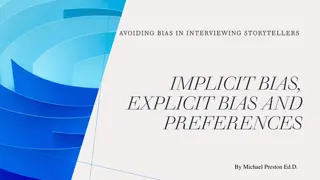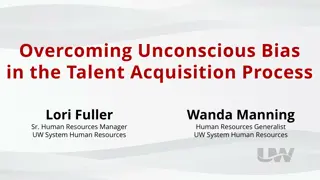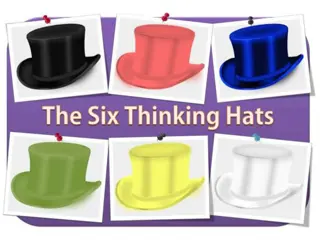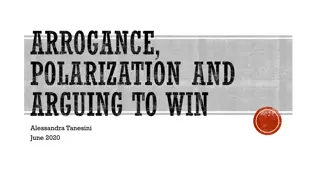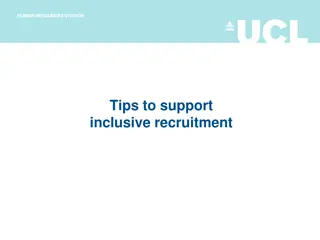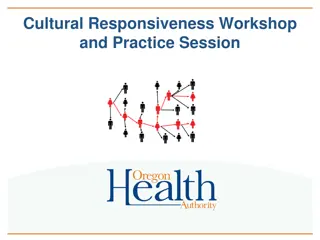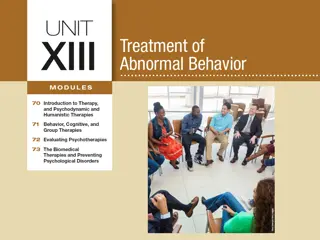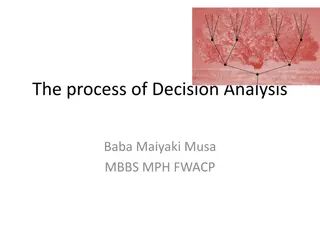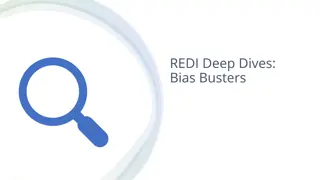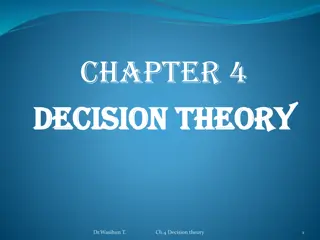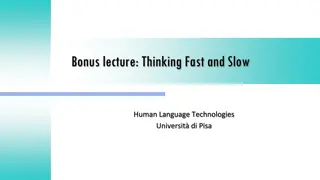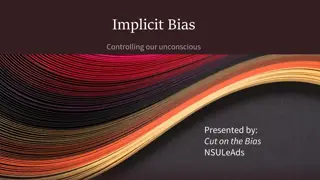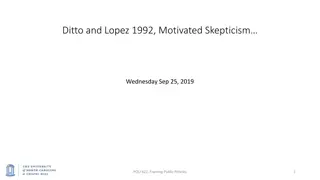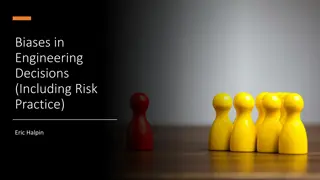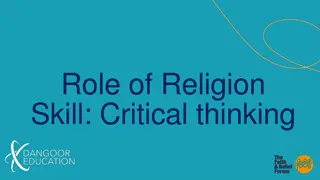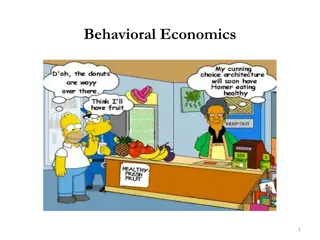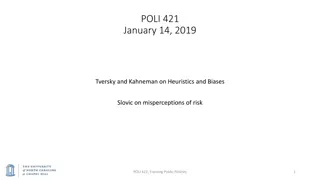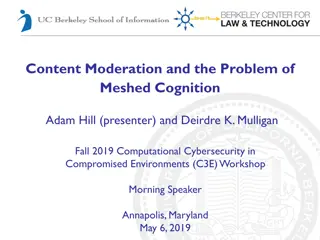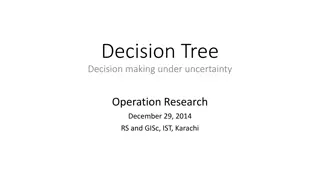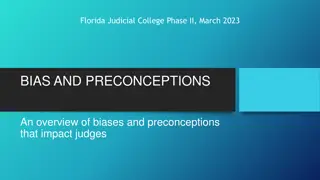Understanding Intersectionality in AI: Analyzing Biases in Generative Systems
Machine learning in AI can perpetuate biases related to race and gender. This workshop explores the concept of intersectionality to analyze how AI-generated avatars represent identities based on race, gender, and ethnicity. Participants will learn to recognize biases in generative AI and develop cri
4 views • 25 slides
Understanding Brain Development and Decision-Making Skills
Explore the fascinating realm of brain development and decision-making skills, focusing on how different brain regions activate during decision-making, the evolution of decision-making abilities from adolescence to adulthood, the importance of practicing decision-making skills, and the influence of
6 views • 10 slides
Evaluating Gender Bias in BERTi: Insights on Large Language Models
This study delves into gender bias evaluation in BERTi, a large language model trained on South Slavic data. It explores issues in language modeling, the impact of social biases in artificial intelligence, and training processes of Large Language Models (LLMs). Additionally, it discusses how LLMs le
11 views • 16 slides
Recognizing Hidden Bias in the Workplace
In the workplace, hidden bias, also known as implicit bias, can significantly impact hiring, employment decisions, and overall workplace dynamics. Deloitte's 2019 State of Inclusion Survey revealed that a substantial percentage of workers experienced bias at least monthly. Hidden biases can be based
3 views • 18 slides
Understanding Hammurabi's Code: Rich vs. Poor, Men vs. Women, and Biases
Explore the ancient laws of Hammurabi's Code and their implications on social classes and gender roles. Uncover how the rich were treated differently from the poor and how men held greater rights than women under this legal system. Analyze the biases of Hammurabi, a wealthy king, and understand how
0 views • 12 slides
Understanding Artefacts and Biases in Gene Set Analysis
Gene set enrichment tests help identify functional gene sets enriched in hit lists compared to background sets. Various biases (technical, biological, statistical) can lead to incorrect conclusions in data analysis, emphasizing the importance of recognizing and addressing them. Technical biases like
0 views • 29 slides
Implementing Blind Evaluation Pilot in HORIZON EUROPE: Key Facts and Process
HORIZON EUROPE is conducting a pilot on Blind Evaluation in the 2023-2024 work program to address biases in the research and innovation evaluation process. The pilot aims to assess the feasibility of blind evaluations in ensuring fairness and mitigating potential biases towards well-known organizati
9 views • 9 slides
Enhancing Peer Review Quality Through Double-Blind Reviewing in ACM Conferences
Double-blind reviewing (DBR) is increasingly recognized for its effectiveness in reducing biases, improving article quality, and practicality in ACM conferences. Studies show evidence of gender and institutional biases in single-blind reviewing, while DBR enhances fairness and credibility. DBR revie
0 views • 9 slides
Enhancing Career Decision Making Process
Explore the importance of good decision-making, types of decision makers, problems faced in decision making, readiness factors for career decisions, decision-making processes, and the CASVE cycle. Understand the significance of effective decision-making skills and how they impact our lives.
0 views • 26 slides
Understanding and Overcoming Bias in Interviewing
Bias in interviewing can arise from implicit and explicit prejudices, impacting perceptions and interactions with interviewees. Implicit biases are unconscious, while explicit biases are deliberate. Recognizing and addressing biases is essential to conduct fair and effective interviews. Examples ill
0 views • 17 slides
Overcoming Unconscious Bias in Talent Acquisition Process
Overcoming Unconscious Bias in Talent Acquisition Process emphasizes the importance of addressing unconscious bias in hiring practices through awareness and control. The content delves into defining unconscious bias, its impact on diversity, examples, and strategies for managing bias. The University
0 views • 19 slides
Introduction to Six Thinking Hats Method for Effective Group Decision Making
Explore the Six Thinking Hats method, a powerful tool for facilitating group discussions and decision-making processes. This method encourages participants to approach problems from various perspectives represented by different colored 'hats'. By simplifying thinking and fostering constructive dialo
1 views • 24 slides
The Impact of Arrogance and Polarization on Group Deliberation
Individuals' biases and tendencies towards arrogance and overconfidence can hinder good group deliberation. The motivation to argue for learning, rather than winning, contributes to better group discussions. Understanding biases as features rather than bugs can lead to improved group judgment. Indiv
0 views • 19 slides
Effective Tips for Inclusive Recruitment Process
Effective inclusive recruitment requires avoiding biases, implementing positive action, using structured methods, fair short-listing, asking good interview questions, having model answers, and assessing candidates objectively. Overcoming biases and promoting diversity are essential to hiring the bes
0 views • 11 slides
Exploring Cultural Responsiveness Through Workshops & Practice Sessions
This content provides a comprehensive guide on cultural responsiveness through workshops and practice sessions. It covers topics like cultural sensitivity, biases identification, and ways to reduce implicit biases. Resources, videos, and insights on cultural knowledge and awareness are shared to pro
0 views • 19 slides
Evaluating the Effectiveness of Psychotherapy: Evidence and Critiques
Evidence suggests that psychotherapy works for many individuals, with high satisfaction rates reported. Critics, however, raise concerns about placebo effects, therapist biases, and human biases influencing perceptions of success. Clinicians acknowledge successful cases but remain cautious of cognit
0 views • 36 slides
Understanding Decision Analysis in Work-related Scenarios
Decision analysis plays a crucial role in work-related decision-making processes, helping in identifying decision makers, exploring potential actions, evaluating outcomes, and considering various values involved in the decision. This module delves into the steps involved in decision analysis, provid
0 views • 76 slides
Understanding Hammurabi's Code: Rich vs. Poor, Men vs. Women, and Biases
Explore the ancient laws of Hammurabi's Code and analyze how they differentiated punishments based on social status and gender. Learn about the biases of King Hammurabi and how they influenced the legal system he established in Mesopotamia. Delve into the historical context to understand the unequal
0 views • 12 slides
Hidden Biases Awareness Workshop: Exploring Unconscious Prejudices
Delve into the complexities of hidden biases through an insightful workshop discussing stereotypes, microaggressions, and unconscious prejudice. This session aims to raise awareness, encourage dialogue, and provide resources for personal development in diversity and inclusion. Explore real-world exa
0 views • 12 slides
Comprehensive Guide to Decision Making and Creative Thinking in Management
Explore the rational model of decision-making, ways individuals and groups make compromises, guidelines for effective decision-making and creative thinking, utilizing probability theory and decision trees, advantages of group decision-making, and strategies to overcome creativity barriers. Understan
0 views • 30 slides
REDI Deep Dives: Bias Busters Activity
Engage your team in activities to uncover implicit biases and promote equity and inclusivity. This slideshow resource guides participants through reflection and discussions on bias impact on decision-making. Learn how to recognize and address biases within a group setting for a more resilient and in
0 views • 12 slides
Introduction to Decision Theory in Business Environments
Decision theory plays a crucial role in business decision-making under conditions of uncertainty. This chapter explores the key characteristics of decision theory, including alternatives, states of nature, payoffs, degree of certainty, and decision criteria. It also introduces the concept of payoff
0 views • 41 slides
Understanding Decision Trees in Machine Learning with AIMA and WEKA
Decision trees are an essential concept in machine learning, enabling efficient data classification. The provided content discusses decision trees in the context of the AIMA and WEKA libraries, showcasing how to build and train decision tree models using Python. Through a dataset from the UCI Machin
3 views • 19 slides
Group Decision-Making: The Wisdom of Crowds and Stupidity of Herds
This presentation by Richard Zeckhauser of Harvard University delves into the importance of rational analysis and subjective probability in group decision-making processes. It emphasizes the need to focus on collective wisdom while avoiding biases that can affect group decisions. Key concepts covere
2 views • 22 slides
Cognitive Biases and Decision Making: An Exploration of Human Psychology
Explore the fascinating realm of cognitive biases and decision-making through various mind-bending puzzles and scenarios. Dive into concepts such as fast and slow thinking, logical reasoning, and the impact of biases on our everyday choices. Challenge your cognitive reflection with intriguing questi
0 views • 14 slides
Understanding Implicit Bias and Overcoming Negative Biases
Implicit bias influences attitudes and behaviors unconsciously. Learn about its key characteristics, testing methods like the Implicit Association Test, and how to combat negative biases through mindfulness techniques. Explore real-world examples and strategies to address biases effectively.
0 views • 19 slides
Understanding Motivated Skepticism in Public Policy Framing
Exploring how individuals display motivated skepticism in evaluating information related to public policies and medical news, influencing their decisions and perceptions. The phenomenon is examined through studies highlighting biases towards preferred information, impacting how individuals rate inte
0 views • 9 slides
Managing Biases in Engineering Decisions - Strategies and Tools
Dive into the complexities of biases in engineering decisions, particularly in risk assessment, and explore ways to identify, understand, and manage biases effectively. Discover insightful strategies, responsibilities, and tools to mitigate biases and enhance decision-making processes in engineering
0 views • 11 slides
The Assisted Decision-Making (Capacity) Act 2015 in the Criminal Justice Context
The Assisted Decision-Making (Capacity) Act 2015 introduces key reforms such as the abolition of wards of court system for adults, a statutory functional test of capacity, new guiding principles, a three-tier framework for support, and tools for advance planning. It emphasizes functional assessment
0 views • 17 slides
Enhancing Critical Thinking Through Examining the Role of Religion
Explore the role of religion in developing critical thinking skills by identifying biases, critically evaluating information sources, and fostering nuanced perspectives. Reflect on personal biases, sources of information, and engagement with controversial issues. Enhance critical thinking by analyzi
0 views • 12 slides
Implementing Group Decision-Making Tools with Voting Procedures at Toulouse E-Democracy Summer School
Decision-making in organizations is crucial, and group decision-making can lead to conflicts due to differing views. Group Decision Support Systems (GDSS) are essential for facilitating decision-making processes. The Toulouse E-Democracy Summer School discusses the implementation of voting tools in
0 views • 21 slides
Enhancing Engagement and Addressing Biases in Family-Centered Support
Explore the significance of active listening, engagement, and combating biases in supporting families within the child welfare system. Learn about the importance of involving parents and caregivers, understanding biases, and implementing strategies to reduce implicit bias. Emphasizing family voices
1 views • 18 slides
Decision Analysis: Problem Formulation, Decision Making, and Risk Analysis
Decision analysis involves problem formulation, decision making with and without probabilities, risk analysis, and sensitivity analysis. It includes defining decision alternatives, states of nature, and payoffs, creating payoff tables, decision trees, and using different decision-making criteria. Wi
0 views • 27 slides
Understanding Behavioral Economics and Decision Making
Behavioral economics challenges the traditional rational agent model by incorporating insights from psychology into economic behavior analysis. This approach reveals systematic biases and departures from rational decision-making, leading to a better understanding of why people make certain choices.
0 views • 16 slides
Understanding Cognitive Biases in Decision Making
Explore Tversky and Kahneman's research on heuristics and biases, Slovic's insights on risk misperceptions, and the implications of cognitive biases in decision-making processes. Delve into topics such as representativeness, availability bias, anchoring, and Prospect Theory by Kahneman and Tversky.
0 views • 12 slides
Challenges in Content Moderation and Cognitive Performance
The content discusses the impact of global social information environment and human-centric cyber vulnerabilities on cognitive performance. It emphasizes the erosion of cognitive abilities due to biases, diminished critical thinking, and exposure to covert exploitation. The dynamics are observed in
0 views • 27 slides
Decision Making Under Uncertainty Using Decision Trees
In this scenario, Colaco faces the decision of whether to conduct a market study for their product, Chocola. The decision involves potential national success or failure outcomes, along with the consequences of a local success or failure from the market study. By utilizing decision trees, this comple
10 views • 7 slides
Understanding Biases and Preconceptions in Judicial Decision-Making
Explore the impact of biases and preconceptions on judges, including definitions of bias, prejudice, and implicit bias. Learn how past experiences can influence judicial duties and the importance of judges being aware of their perspectives. Discover exercises to identify biases and potential issues
0 views • 12 slides
The Impact of Foreign Language on Decision-Making Behavior
This research explores how bilingualism affects decision-making by analyzing the behavior of English-Chinese bilinguals in scenarios involving the sunk-cost fallacy. It reveals that reasoning in a foreign language can lead to more rational decisions than in a native language. The study presents vari
0 views • 22 slides
Unpacking Biases and Tackling ISMs in Life
We all carry biases and opinions that influence our decisions. Learning to separate bias from stereotype is crucial for making informed choices. This course delves into identifying and addressing biases to combat ageism, sexism, racism, classism, and homophobia in society.
0 views • 10 slides


